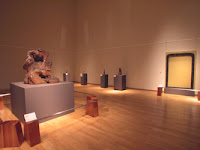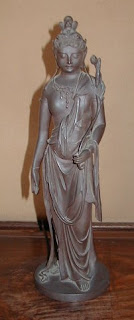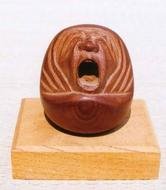:::::::::::::::::::::::::::::::::::::::::::::::::::::::::::::::::::::::::::::::::::::::::::::::::::::
Buddhist Sculptors Gallery
:::::::::::::::::::::::::::::::::::::::::::::::::::::::::::::::::::::::::::::::::::::::::::::::::::::
Takamura Ko-Un
(Takamura Kooun 高村 光雲 (たかむら こううん)

1852 - 1934
嘉永5年2月18日(1852年3月8日) - 1934年(昭和9年)10月10日
His sons are the famous poet and sculptor Takamura Kotaro 高村光太郎 and Takamura Toyochika 高村豊周.
Ko-Un was born in Downtown Edo. He entered the sculputre workshop of Takamura To-Un (Takamura Too-Un 高村東雲) in 1869. The family later adopted him and he took the name of TAKAMURA.
After the war the work for a Buddhist sculptor and other woodcarving was scarce, since ivory was the preferred material of the time, and his life rather poor. So he started to make himself familiar with Western sculpture and then blow some new life to traditional Japanese carving. He even lectured at the Tokyo University of Arts 東京美術学校.

He created the famous bronze statue of Saigō Takamori, in 1898, which now stands in Ueno Park in Tokyo.
Among his disciples are the famous sculptors Yamazaki Choo-Un 山崎朝雲、Yamamoto Zui-Un 山本瑞雲 and Yonehara Unkai 米原雲海.
:::::::::::::::::::::::::::::::::::::::::::::::::::::::::::::::::::::::::::::::::::::::::::::::::::

In 1877, he was awarded the best prize in the Naikoku-Kangyo Exposition. In 1886, he founded the Tokyo Choko-kai. He taught at the Sculpture Department of the Tokyo School of Fine Arts from 1889. He adopted realistic styles in wood engraving and fostered a younger generation of artists including Choun Yamazaki and Denchu Hiragushi.
In 1919, he became a member of the Teikoku Bijutsu-in. His representative works include "Roen" (The Aged Monkey), "the statue of Masashige Kusunoki", and "the statue of Takamori Saigo".
(C) National Diet Library
The Aged Monkey
老猿(ろうえん)(1983年3月10日発売)

:::::::::::::::::::::::::::::::::::::::::::::::::::::::::::::::::::::::::::::::::::::::::::::::::::
Takamura Koun (1852-1934) is familiar as one of founders of Japanese modern sculpture.
This exhibition in 2002 exhibits Koun’s about 70 wood sculptures and sketches, and at the same time nearly 40 works by wood sculptors surrounding Koun. It aims at shedding light to the roll played by Koun in the history of Japanese modern sculpture, that is, as a peculiar figure bridging between traditional artisanship belonging to Edo period and modernized sculptor after the contact with occidental culture, and his influence to later generations.

(C) www.pref.mie.jp/
:::::::::::::::::::::::::::::::::::::::::::::::::::::::::::::::::::::::::::::::::::::::::::::::::::
Kannon with a fish basket 魚籃観音

more about the Kannon with a fish basket
Daruma Museum
..........................................
Standing Kannon Bosatsu
「聖観音像」

..........................................
高村光雲
English LINK
"Takamura KoUn"
A Woodcarving Master - Takamura Koun
by Takeguchi Momoko
Daruma Magazine 68, september 2010
:::::::::::::::::::::::::::::::::::::::::::::::::::::::::::::::::::::::::::::::::::::::::::::::::::
BACK TO
Who made Buddha Statues ?
Mark Schumacher
Buddhist Sculptors Gallery
Daruma Pilgrims in Japan
:::::::::::::::::::::::::::::::::::::::::::::::::::::::::::::::::::::::::::::::::::::::::::::::::::::






No comments:
Post a Comment